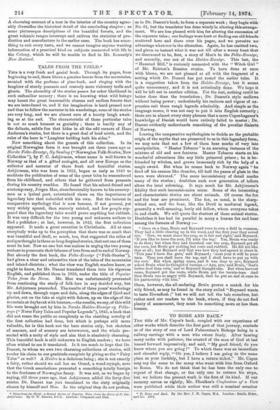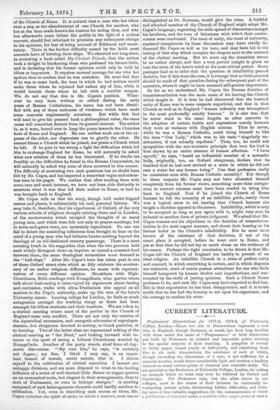TO ROME AND BACK.* THE title of Mr. Capes's book,
coupled with our experience of other works which describe the first part of that journey, reminds us of the story of one of Lord Palmerston's Bishops being in a railway carriage with a man who swore freely. After bearing many oaths with patience, the created of the man of God at last leaned forward impressively, and said, "My good friend, do you know where you are going ?" To which there was an immediate and cheerful reply, "Oh yes, I believe I am going to the same place as your lordship, but I have a return ticket." Mr. Capes may say the same to the many who went with him from Oxford to Rome. We do not think that he has been the only one to repent of that change, or the only one to retrace his steps, but we believe the present work is the first of its kind. If our memory serves us rightly, Mr. Ffoulkes's Confessions of a Vert were published while their author was still a nominal member
To Rome and Bad. By the Rev. J. M. Capes, MA. London: Smith, Elder, and Co. MI of the Church of Rome. It is natural that a man who has taken such a step as the abandonment of one Church for another, who has at the time made known his reasons for acting thus, and who has afterwards come before the public in the light of a zealous convert, should feel reluctant to proclaim any subsequent change in his opinions, for fear of being accused of fickleness and uncer- tainty. There is the further difficulty caused by the habit most converts have of burning their ships. We observed not long since, in reviewing a book called My Clerical Friends, that the author took a delight in blackening those who professed his former faith, and in declaring that his former opinions could only be held by idiots or impostors. It requires unusual courage for one who has spoken thus to confess that he was mistaken. He must feel that if be was to come back, the tone in which he had written would make those whom he rejoined feel rather shy of him, while it would furnish those whom he left with a terrible weapon. We do not say that this is Mr. Capes's position. What- ever he may have written or edited during his early years of Roman Catholicism, his name has not been identi- fied with any of those outbursts of virulence which have made some converts unpleasantly notorious. But while this fact will tend to give his present book a philosophical value, the same cause will somewhat detract from its general interest. The author is, as it were, bound over to keep the peace towards the Churches both of Rome and England. He can neither exalt one at the ex- pense of the other, nor depreciate one to glorify the other. He cannot blame a Church which he joined, nor praise a Church which he left. If he puts in too strong a light the difficulties which led him to exchange England for Rome, he will naturally be asked what new solution of them he has discovered. If he dwells too forcibly on the difficulties he found in the Roman Communion, he will naturally be asked why none of them occurred to him sooner. The difficulty of answering two such questions has no doubt been felt by Mr. Capes, and has imparted a somewhat vague and colour- less tone to his pages. We confess that after reading them with some care and much interest, we have not been able distinctly to ascertain what it was that led their author to Rome, or how he was brought back to England.
Mr. Capes tells us that his story, though told under feigned names and places, is substantially his real, personal history. We may take it, therefore, that his experiences of Oxford, of the very various schools of religious thought existing there and in London, of the controversies which occupied the thoughts of so many young men, and which were felt not only at prayer-meetings, but in town-and-gown rows, are accurately reproduced. No one can fail to detect the unsettling influences thus brought to bear on the mind of a young man who had hitherto known nothing beyond the theology of an old-fashioned country parsonage. There is a most amusing touch in the suggestion that when the two proctors held such widely divergent views on baptism as caused a constant feud between them, the same theological animosities must descend to the "bull-dogs." After Mr. Capes's hero has taken part in one of those Oxford street riots which so fitly celebrate the anniver- sary of an earlier religious difference, he meets with represen- tatives of every different opinion. Breakfasts with High- Churchmen, Bible-readings with Evangelicals, wine parties where talk about boat-racing is interrupted by arguments about fasting and confession, walks with ultra-Tractarians who appeal on all matters to the Pope's authority, make up the sum of the hero's University career. Leaving college for London, he finds as much antagonism amongst the working clergy as there had been amongst his fellow-students and their teachers. We are taken to a clerical meeting where most of the parties in the Church of England come into conflict. There are not only the votaries of the Apostolical succession, and energetic advocates of supralapsa- rianism, but clergymen devoted to society, to Greek particles, or to hunting. Two of the latter class are represented talking of the .clerical meeting as "the Meet," and looking forward with in- terest to the sport of seeing a Liberal Churchman worried by Evangelicals. Another of the party stands aloof from all dog- matic discussions. "My own line," he says, "is certainly not dogma ; my line, I think I may say, is an impor- tant branch of morals, social morals, that is. I devote myself to the cultivation of clerical amenities. I lament our unhappy divisions, and am more disposed to trust to the healing influence of a series of well-devised little dinner or supper-parties on an economical scale, but elegant in their arrangements, than to Acts of Parliament, or even to bishops' charges." A meeting composed of such heterogeneous elements could hardly conduce to edification. Yet, even in describing such scenes as these, Mr. Capes restrains the spirit of satire to which a convert, even one so distinguished as Dr. Newman, would give the reins. A faithful and attached member of the Church of England might adopt Mr. Capes's language, regretting the wide spread of dissensions amongst his brethren, and the tone of bitterness with which their contro- versies were conducted. The want of unity, the want of authority, rendered conspicuous by these discussions may have chiefly in- fluenced Mr. Capes as well as his hero, and may have led to the taking of that step which occupies the chapter next to the account of the clerical meeting. But we must say the transition seems to us rather abrupt, and that a very partial insight is given us into the state of the hero's mind at the most critical period. Some passages lead us to infer that the question of infallibility proved decisive, but if this were the case, it is strange that so little account should be made of that question during the subsequent part of the narrative, where it ought to have assumed still greater importance.
So far as we understand Mr. Capes, the Roman doctrine of transubstantiation was the main cause of his leaving the Church which taught it. It is true he had discovered that the boasted unity of Rome was in some respects superficial, and that in that Church as well as in England "human infirmity was triumphant in the most professedly saintly bosoms." It is also true that he never went to the same lengths as other converts in the adoption of certain habits and expressions merely because they were at variance with English notions. Thus he never, while be was a Roman Catholic, could bring himself to like the term "Our Lady," which was to his taste "singularly un- attractive, if not actually repellent." Thus, too, he could not sympathise with the neo-monastic principle that love for God is best shown by an entire absence of human affection. "I have myself," he says, "heard an influential member of a monastic body, originally, too, an Oxford clergyman, declare that he thanked God he had now arrived at a state in which he did not care a straw for any human being." Can that profession really be consistent even with Roman Catholic morality? Yet though in these respects Mr. Capes may not have alienated himself completely from his former views, something more than antago- nism to convert excesses must have been needed to bring him back to England. Now if he joined the Church of Rome because he felt the necessity of an infallible guide, surely there was a logical error in his leaving that Church because she taught a doctrine opposed to the senses. Infallibility, which is only to be accepted so long as you agree with it, might very soon be reduced to another form of private judgment. We admit that Mr. Capes reasons out his objections to the doctrine of transubstan- tiation in the most cogent manner, and shows their bearing on his former belief in the Church's infallibility. But be must have known of the existence of that doctrine, if not of the exact place it occupied, before he went over to Rome, and yet at that time he did not lay so much stress on the evidence of his senses. Perhaps the right conclusion to be drawn is that Mr. Capes left the Church of England too hastily in pursuit of an ideal religion. An infallible Church in a state of perfect unity and concord, in which everything is certain, and in which disputes are unknown, must of course possess attractions for one who finds himself hampered by human doubts and imperfections, and sur-
rounded by the strife of jarring opinions. Such a Church Rome professes to be, and such Mr. Capes may have expected to find her. But in that expectation he has been disappointed, and it is to his credit that he has had the honesty to act upon his experience, and the courage to confess his error.



































 Previous page
Previous page